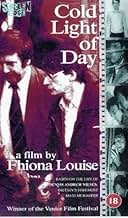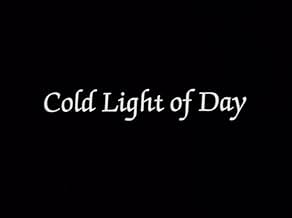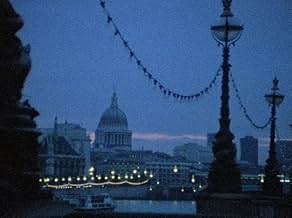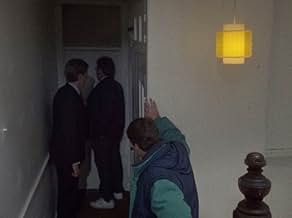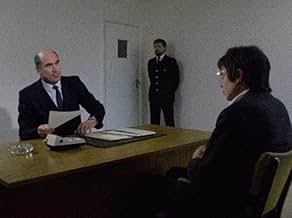Fiktionalisierter Bericht, der auf den Taten des Serienmörders Dennis Nilsen basiert.Fiktionalisierter Bericht, der auf den Taten des Serienmörders Dennis Nilsen basiert.Fiktionalisierter Bericht, der auf den Taten des Serienmörders Dennis Nilsen basiert.
- Auszeichnungen
- 1 wins total
Eugene Cheese
- Grandfather
- (as Paul Jay)
Louis Haslar
- Rent Boy
- (as Louis Hasler)
Empfohlene Bewertungen
Produced by, and with strong ties (no pun intended!) to "Britain's worst director" (and convicted fraudster) Richard Driscoll, this film, which I first saw near its original release in the 90s, has curiously been resurrected from cinema's dustbin for a recent Blu-ray.
Booed off the screen (literally!) upon its limited release in 1990, this fictionalised 'true story' of the Dennis Nilsen serial killer case from north London in the early 80s is told with zero subtlety or respect. Massively re-adjusting events (for titillation, I'm guessing. For example, 'Nilsen' visits a female prostitute - something which never happened and only seems an excuse to show crude T&A) and the barely-a-feature film includes an insulting, confusing end caption.
It's hard to say what director Fhiona Louise (sometimes styled as Fhiona-Louise -- which is it?!) intended, but the stodgy dialogue and delivery has Driscoll written all over (see, or really don't, any of his other epics like The Comic or Kannibal) and the filmmaking looks like something unsure film students would do, complete with awkward camera half-moves and bit-parters delivering unintentional comedy (a senile neighbour shuffles back to his room like it's a comedy-act and we get lines like "oh s**t!" about a blocked toilet uttered with zero self-awareness).
The whole film only succeeds in capturing the grim reality of Bedsitland at the time (purely by coincidence as many parts of the now gentrified North London were still like that at the time), becoming a period piece in a way.
Ultimately though, it has nothing to say, no care for the victims and generally seems concocted as a quick cash-grab.
Ironically (or why it was rereleased when nobody was asking for it?), a big budget ITV dramatisation of the Nilsen case was also shown in 2020, the same year as Arrow's Blu-ray Special Edition. Unlike Cold Light of Day, it decided to avoid all of the gruesome aspects and position itself as a generic detective drama with a smattering of stock-footage for confusing context.
Those wishing to find out more about the real case are better off seeking out the thorough book Killing for Company.
There's also a BBC Two short film from the late 80s called (viewable on YouTube) called The Monochrome Man which says far more - with much greater assuredness and panache - than this amateurish film ever could.
Booed off the screen (literally!) upon its limited release in 1990, this fictionalised 'true story' of the Dennis Nilsen serial killer case from north London in the early 80s is told with zero subtlety or respect. Massively re-adjusting events (for titillation, I'm guessing. For example, 'Nilsen' visits a female prostitute - something which never happened and only seems an excuse to show crude T&A) and the barely-a-feature film includes an insulting, confusing end caption.
It's hard to say what director Fhiona Louise (sometimes styled as Fhiona-Louise -- which is it?!) intended, but the stodgy dialogue and delivery has Driscoll written all over (see, or really don't, any of his other epics like The Comic or Kannibal) and the filmmaking looks like something unsure film students would do, complete with awkward camera half-moves and bit-parters delivering unintentional comedy (a senile neighbour shuffles back to his room like it's a comedy-act and we get lines like "oh s**t!" about a blocked toilet uttered with zero self-awareness).
The whole film only succeeds in capturing the grim reality of Bedsitland at the time (purely by coincidence as many parts of the now gentrified North London were still like that at the time), becoming a period piece in a way.
Ultimately though, it has nothing to say, no care for the victims and generally seems concocted as a quick cash-grab.
Ironically (or why it was rereleased when nobody was asking for it?), a big budget ITV dramatisation of the Nilsen case was also shown in 2020, the same year as Arrow's Blu-ray Special Edition. Unlike Cold Light of Day, it decided to avoid all of the gruesome aspects and position itself as a generic detective drama with a smattering of stock-footage for confusing context.
Those wishing to find out more about the real case are better off seeking out the thorough book Killing for Company.
There's also a BBC Two short film from the late 80s called (viewable on YouTube) called The Monochrome Man which says far more - with much greater assuredness and panache - than this amateurish film ever could.
"Cold Light of Day" follows a middle-aged man in London who begins preying on street punks and homeless men, bringing them back to his apartment where he inevitably kills them (before doing other horrible things).
Based on the crimes of Dennis Nilsen, this little-seen no-budget effort is a lot better than you might expect it to be. On one hand, it is very "student film"-ish, which is not necessarily surprising given that its writer-director was only 21 years old when it was released. That being said, this is quite an impressive debut, especially for someone of that age.
While not exactly an enjoyable viewing experience, there is something oddly compelling about the film; the narrative is pretty standard for this type of fare (killer recounts crimes in flashback, rinse and repeat), but a dour, gritty sensibility permeates every frame here, and the effect is powerful. An ominous, repetitive musical score adds to the mood (mixed with a never-ending heartbeat effect) amicably, and the performances are quite solid, despite what some of the other reviewers have written. The special effects are also respectable. The only legitimate problem I had with the the film is that it does not really have a fitting conclusion, which does leave a bit to be desired.
That said, this is a fairly potent effort that paints the life of a killer in shades of pallid grey. "Cold Light of Day", though not revolutionary, is a dour and straightforward look into a world of tormented people, some predators, and some prey. Despite its student film-ish shortcomings, it is a fairly well made crime-horror hybrid. 6/10.
Based on the crimes of Dennis Nilsen, this little-seen no-budget effort is a lot better than you might expect it to be. On one hand, it is very "student film"-ish, which is not necessarily surprising given that its writer-director was only 21 years old when it was released. That being said, this is quite an impressive debut, especially for someone of that age.
While not exactly an enjoyable viewing experience, there is something oddly compelling about the film; the narrative is pretty standard for this type of fare (killer recounts crimes in flashback, rinse and repeat), but a dour, gritty sensibility permeates every frame here, and the effect is powerful. An ominous, repetitive musical score adds to the mood (mixed with a never-ending heartbeat effect) amicably, and the performances are quite solid, despite what some of the other reviewers have written. The special effects are also respectable. The only legitimate problem I had with the the film is that it does not really have a fitting conclusion, which does leave a bit to be desired.
That said, this is a fairly potent effort that paints the life of a killer in shades of pallid grey. "Cold Light of Day", though not revolutionary, is a dour and straightforward look into a world of tormented people, some predators, and some prey. Despite its student film-ish shortcomings, it is a fairly well made crime-horror hybrid. 6/10.
How this ever got a blu ray release is beyond me, so amateurish in terms of acting and production, and the picture quality is truly appalling. Like some mates have got together with a camcorder and decided to make a film. Really not worth your time.
"Cold Light Of Day" is more of a dramatisation than a film; fairly short, it explores the psychology of one of modern Britain's monsters. Dennis Nilsen murdered twelve, possibly more, young men, purely for his own gratification. A necrophiliac as well as a sexual sadist, his fascination with death is believed to have sprung from the death of his grandfather, that is if we can believe anything he said.
We see flashbacks to his boyhood but the film concentrates on his picking up his victims and murdering them. There is also an attempt to humanise him by showing his acts of kindness to an elderly neighbour. To which the best reply is so what? Ted Bundy actually worked on a suicide prevention helpline.
The names have been changed, which is understandable for victims and incidental characters, but was it necessary to change Nilsen's name to Jorden March? Lead actor Bob Flag bears a striking resemblance to Nilsen - hopefully only a physical one! - and it is easy to see why this ultra-low budget effort picked up a prize at the 1990 Venice Film Festival.
We see flashbacks to his boyhood but the film concentrates on his picking up his victims and murdering them. There is also an attempt to humanise him by showing his acts of kindness to an elderly neighbour. To which the best reply is so what? Ted Bundy actually worked on a suicide prevention helpline.
The names have been changed, which is understandable for victims and incidental characters, but was it necessary to change Nilsen's name to Jorden March? Lead actor Bob Flag bears a striking resemblance to Nilsen - hopefully only a physical one! - and it is easy to see why this ultra-low budget effort picked up a prize at the 1990 Venice Film Festival.
If you are reading this you will have come here with a purpose. The sadistic trail of murderous narcissism left behind by Dennis Nilsen from 1978 until being caught in 1983 will be familiar.
This low budget retelling, in the style of a reject Channel 4 documentary, disappoints on several levels. The production could have been much more effective as a Film Noir. Narrative should drive the action which takes place in the shadows. Much more should have been made of conceptual imagery. The long, wandering take of Nilsen's room that concludes the film hints at what is possible.
One of the first ideas drummed into fledgling film editors is that sound is king. People will forgive the occasional wobble or slip in focus, even a dreadful edit, but will only endure a few moments of poor sound. From the opening whirl and deafening whoosh of whistling wind underpinned with rhythmic thumps, through the oh so too long tolling funeral bell complete with Darth Vader breathing, to the invasive wild-takes in street scenes, the soundtrack is jarring.
The action of the film, concerning the enticement of the victims, their strangulation and drowning, followed by their dismemberment and disposal, is interspersed with sections of the police interview after arrest. My reading of the notes taken at the time, this was before PACE and the routine tape recording of interviews, along with the subsequent evidence at trial, portrays a civil interrogation of a compliant, emotionless Nilsen, calmly admitting to his crimes. In Fhiona Louise's version here we have the lead detective, Chief Inspector Simmons (Geoffrey Greenhill), in real life DCI Peter Jay, railing and shouting with his suspect, trying to obtain admissions of perversion and worse.
The Nilsen character is played by Bob Flag, bearing an uncanny resemblance to the murderer. For the film he is renamed Jorden March, possibly a nod to Whitemoor prison where, for a while, he was held.
If you know nothing about this case then pass this one by. If you are knowledgeable then you will find nothing new here except interpretation. If you are looking for a low budget, amateurish, short to deconstruct then you have hit the jackpot.
This low budget retelling, in the style of a reject Channel 4 documentary, disappoints on several levels. The production could have been much more effective as a Film Noir. Narrative should drive the action which takes place in the shadows. Much more should have been made of conceptual imagery. The long, wandering take of Nilsen's room that concludes the film hints at what is possible.
One of the first ideas drummed into fledgling film editors is that sound is king. People will forgive the occasional wobble or slip in focus, even a dreadful edit, but will only endure a few moments of poor sound. From the opening whirl and deafening whoosh of whistling wind underpinned with rhythmic thumps, through the oh so too long tolling funeral bell complete with Darth Vader breathing, to the invasive wild-takes in street scenes, the soundtrack is jarring.
The action of the film, concerning the enticement of the victims, their strangulation and drowning, followed by their dismemberment and disposal, is interspersed with sections of the police interview after arrest. My reading of the notes taken at the time, this was before PACE and the routine tape recording of interviews, along with the subsequent evidence at trial, portrays a civil interrogation of a compliant, emotionless Nilsen, calmly admitting to his crimes. In Fhiona Louise's version here we have the lead detective, Chief Inspector Simmons (Geoffrey Greenhill), in real life DCI Peter Jay, railing and shouting with his suspect, trying to obtain admissions of perversion and worse.
The Nilsen character is played by Bob Flag, bearing an uncanny resemblance to the murderer. For the film he is renamed Jorden March, possibly a nod to Whitemoor prison where, for a while, he was held.
If you know nothing about this case then pass this one by. If you are knowledgeable then you will find nothing new here except interpretation. If you are looking for a low budget, amateurish, short to deconstruct then you have hit the jackpot.
Handlung
WUSSTEST DU SCHON:
- WissenswertesClaire King has a small role in this film as a Prostitute who is better known as Kim Tate in popular UK Drama Emmerdale.
- PatzerIn the end credits, the word 'prosthetics' is misspelled 'prosphetics'.
- Crazy CreditsBefore the end credits, a caption appears that reads 'For those too sensitive for this world - Fhiona'.
- VerbindungenReferenced in Film Junk Podcast: Episode 905: Talk to Me + Extra Terrestrial Visitors (2023)
Top-Auswahl
Melde dich zum Bewerten an und greife auf die Watchlist für personalisierte Empfehlungen zu.
- How long is Cold Light of Day?Powered by Alexa
Details
- Laufzeit1 Stunde 20 Minuten
- Farbe
- Seitenverhältnis
- 1.37 : 1
Zu dieser Seite beitragen
Bearbeitung vorschlagen oder fehlenden Inhalt hinzufügen


